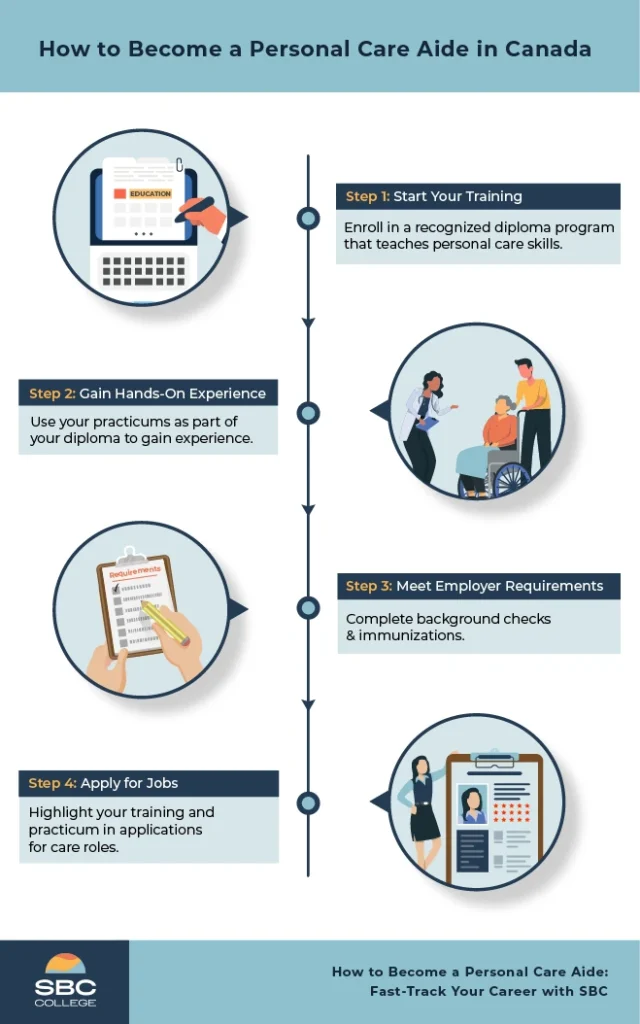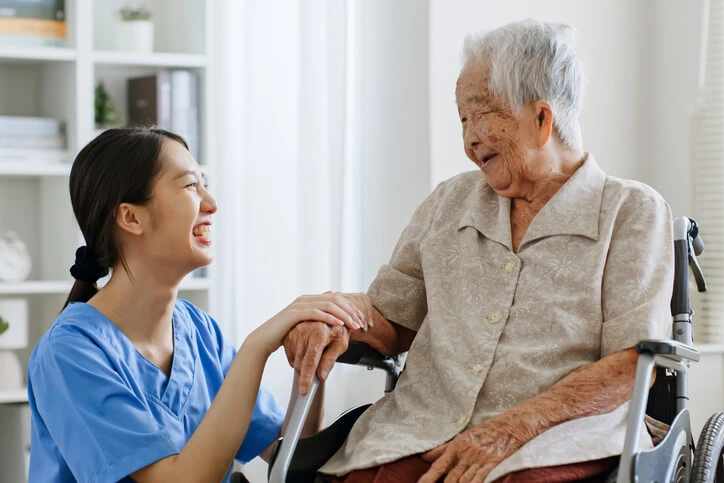Table of Contents
For many aspiring personal care aides, the trickiest part is figuring out where to start. Do you need a certain type of training? Are there specific requirements based on where you want to work? These are some important questions to ask before you commit to anything.
With personal care aide demand growing across Canada, more people are choosing this caregiver career for its quick training, direct involvement in patient care, and good job prospects.
Before we get into the details of becoming a personal care aide, here’s what you need to know.
Listen to: How to Become a Personal Care Aide: Fast-Track Your Career with SBC
Who Should Become a Personal Care Aide?
Are you someone who doesn’t think twice before helping others? Maybe you’ve looked after a family member, supported a neighbour, or stepped in when someone needed care. If you’ve done that sort of work before, a career change to healthcare could be your next step.
Personal care aides support people with daily routines like getting dressed, preparing meals, and moving around safely. They offer conversation and support that brings comfort in everyday moments. Some care situations also call for teamwork and knowing when to ask for help is part of supporting someone.
If you’re someone who notices the little details, shows up when it matters, and treats others with patience and respect, this is the kind of work where those qualities are appreciated every day.
What Does a Personal Care Aide (PCA) Do?
PCA job duties involve supporting people with daily needs, whether they’re older adults, individuals living with disabilities, or someone recovering after a hospital stay. The care is personal, and the impact is immediate. You become an essential part of someone’s everyday life. Here’s what the daily tasks of a personal care aide typically involve:
Day-to-Day Responsibilities

Your day may begin by assisting patients with getting out of bed and getting ready for their day. This might include personal care tasks such as helping with washing up, choosing clothes to wear, or preparing a light breakfast.
Later on in the day, you may help them move around safely in their home or care facility, assist with lunch, or support them in doing simple activities that keep them engaged. Some clients may also need reminders to take medication or additional help with personal care.
You may also look after the living space around your clients. That can mean changing bed linens, keeping things clean, and paying close attention to how they are feeling. Noticing changes in their mood, energy, or comfort is a critical part of the job, and sharing those observations with the care team helps them get the support they need.
Sharon D., a Personal Care Aide program instructor at SBC College, emphasizes the responsibility you have to pay close attention to your client:
“You can’t always tell what someone needs at first glance. One day you’re helping with meals and mobility, the next you’re noticing subtle changes like them being quieter than usual. Picking up on those moments is just as important as following the care routine.”
This kind of awareness can be the difference between a concern being caught early and a health issue going unnoticed.
You are present for everyday moments. A short walk down the hallway. A chat during a meal. Sitting nearby while someone rests or watches a show. These interactions help your client feel seen and valued. They create moments of conversation, encouragement, and gentle activity that support both body and mind.
For someone who rarely sees family or friends, your presence can be the most important part of their day.
Steps to Becoming a Personal Care Aide in Saskatchewan
If you’re exploring how to become a PCA in Saskatchewan, here are the steps you’ll need to follow:
Step 1. Enroll in a Recognized Personal Care Aide Diploma Program
To work as a personal care aide, most employers require you to complete a recognized personal care aide training program. These diploma programs are offered through career colleges recognized by the Saskatchewan Health Authority and typically take about ten months to complete. During your training, you’ll build practical skills to assist with personal care, infection control, patient mobility, nutrition, and communication.
You’ll also build specialized knowledge in areas like dementia care, abuse prevention, and supporting clients with hearing, vision, or mobility challenges—skills that help you work with a wider range of clients.
Some diploma programs also include certifications in CPR, Food Safe Level 1, and Transferring, Lifting, and Repositioning (TLR), which are commonly required by employers.
Step 2. Get Practical Experience Through Clinical Placement
The best diploma programs include clinical placements or practicums. This gives you the chance to apply your training in professional care settings, work alongside experienced staff, and respond to the needs of different clients. It also helps you learn what type of work environment suits you best, whether that’s home care or a long-term care facility.
Step 3. Meet Employer Requirements
In Saskatchewan, employers ask for a background check, up-to-date immunization records, and certifications like CPR and Food Safe Level 1. These requirements are in place to protect clients, reduce health risks, and make sure the people providing care are prepared to handle emergencies and follow safe practices.
Step 4. Apply for Jobs and Customize Your Resume
Once you’ve completed your coursework and practicums, you can start applying for positions in long-term care facilities, hospitals, group homes, or home care agencies. Tailor your resume for each role by highlighting experience that fits the setting. For example, if you’re applying to a long-term care facility, include your practicum duties like assisting with mobility, personal hygiene, or daily routines. If you’re applying to a home care agency, focus on your ability to work independently, prepare meals, and support clients one-on-one. List certifications such as CPR, Food Safe Level 1, and TLR clearly under a “Certifications” section so they’re easy to find.
Following these steps prepares you to take on personal care work with the training and awareness clients rely on. Whether you’re helping someone manage their medication or recognizing early signs of dementia, your training can make a difference in how safe and supported your client feels.

Job Outlook & Salary Expectations
Personal care aides are in high demand across Canada, with good job prospects in every province and territory. This demand is driven by an aging population, growing home care needs, and a large number of current workers nearing retirement.
Between 2024 and 2033, Canada is expected to face a strong shortage of trained personal care aides, making this a stable career path with long-term opportunities.
Wages typically range from $18 to $27 per hour, depending on your province, experience, and workplace setting.
If your goal is to start your career in care and make a difference in the lives of others, becoming a personal care aide offers stable employment, competitive wages, and the chance to be there for someone when it counts.
Why Choose SBC College’s Personal Care Aide Program?
If you want to start working as a personal care aide within a year, SBC College’s Personal Care Aide Diploma Program offers a direct path. You’ll build the skills needed to assist with daily care routines, communicate with clients respectfully, and respond when someone’s condition changes.
Your training includes hands-on learning in personal care, dementia care, nutrition, and mobility support. You begin with theory-based classes, simulated lab sessions on personal care, and Saskatchewan Health Authority-specific training. Together, these components prepare you for practicum placements in both home care and long-term care. Working in different settings helps you apply your skills and understand where you feel most comfortable.
Students who meet expectations during this stage are offered a paid practicum while completing the remainder of the program. Certifications in CPR, Food Safe Level 1, and transferring techniques are included in the program, so you graduate ready to meet workplace expectations.
SBC’s Personal Care Aide instructor Sharon D. highlights how classroom training connects to the workplace, “Everything students learn relates directly to what happens in an actual care setting, so when it’s time to provide support, they know exactly what to do.
We train students to support care routines and also recognize when something isn’t right. That includes noticing early signs of infection, changes in behaviour, or risks that need attention right away.”
This emphasis on applied learning helps students build the confidence to manage both routine care and unexpected situations.
SBC’s Personal Care Aide program is the starting point for a meaningful career – one where helping others is not just rewarding, but exactly where you belong.
To get started, contact an admissions advisor today.
Personal Care Aide FAQs
What is the difference between a personal care aide and a personal support worker?
In Canada, the title personal care aide (also known as health care aide or continuing care aide) is commonly used in provinces like Nova Scotia and Saskatchewan, while personal support worker (PSW) is more common in Alberta, New Brunswick and Ontario. Both provide support with daily living activities such as bathing, dressing, mobility, and meal preparation. The main difference lies in terminology and provincial regulation rather than in the nature of the work.
Do I need a certification to work as a personal care aide in Canada?
Yes, most provinces require personal care aides to complete a recognized training program before they can be hired. In some provinces, employers also expect you to submit immunization records and a Criminal Record Check with a Vulnerable Sector Search before starting your practicums or applying for CCA jobs.
How long does it take to become a personal care aide?
You can complete your personal care aide training in 10 months through SBC College’s Personal Care Aide Diploma Program. Training includes skill-building in areas like personal care, infection control, nutrition, safety, dementia support, and medical terminology. You’ll also complete certifications in CPR, TLR (Transferring, Lifting, and Repositioning), and Food Safe Level 1 before applying your knowledge in clinical placements.
What is the job outlook for personal care aides in Canada?
The job outlook for personal care aides in Canada is strong, with growing demand in every province due to an aging population and increasing home care needs.
Are there background checks or immunization requirements?
Yes. Most programs and employers require a clear criminal record check, vulnerable sector check, and up-to-date immunizations before starting a practicum or job. This helps protect the safety of clients and staff in care settings.






